Meaning Of Oliver In The Bible: Name Meaning
The name Oliver, stemming from the Latin ‘olivarius’ meaning ‘olive tree planter,’ resonates profoundly in biblical contexts. The olive tree symbolizes peace, prosperity, and divine blessing.
Genesis 8:11 reveals the dove bringing an olive leaf to Noah, signaling reconciliation. Olive oil, used for anointing in 1 Samuel 16:13, signifies divine favor.
Romans 11:17-24 uses the olive tree to metaphorically include Gentiles in God’s covenant. This rich biblical symbolism underscores themes of endurance and unwavering faith.
Exploring the name Oliver further reveals more about its spiritual resonance and enduring legacy in biblical narratives.

Meaning of Oliver in the Bible: Symbolism of Peace, Fruitfulness, and Anointing
| Aspect | Description |
|---|---|
| Name Origin | Derived from Latin “olivarius,” meaning olive tree |
| Biblical Connection | Linked symbolically to the olive tree, which appears frequently in the Bible |
| Symbolism | Peace, anointing, fruitfulness, and endurance |
| Key Scripture | Psalm 52:8 – “But I am like a green olive tree in the house of God…” |
| Spiritual Insight | Oliver reflects a life rooted in peace, spiritual strength, and divine favor |
Origin of the Name Oliver
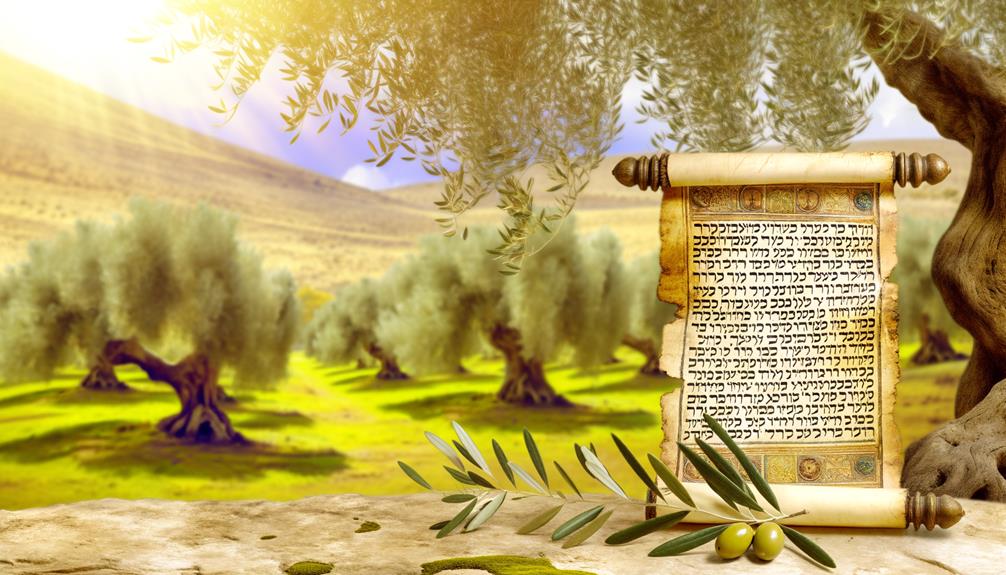
The name Oliver, though not explicitly mentioned in the Bible, has etymological roots that trace back to the Latin word ‘olivarius,’ meaning ‘olive tree planter.’
The olive tree holds significant theological and scriptural relevance, often symbolizing peace, prosperity, and divine blessing. In the Bible, the olive branch brought by the dove to Noah signified God’s covenant of peace (Genesis 8:11).
Additionally, olive oil was used in sacred rituals, anointing kings and priests, as seen in 1 Samuel 16:1-13. Historically, the olive tree represented strength and endurance in the Mediterranean world, aligning with biblical themes of steadfast faith and divine favor.
Consequently, the name Oliver subtly resonates with these deep spiritual and historical connotations.
Latin Roots of Oliver
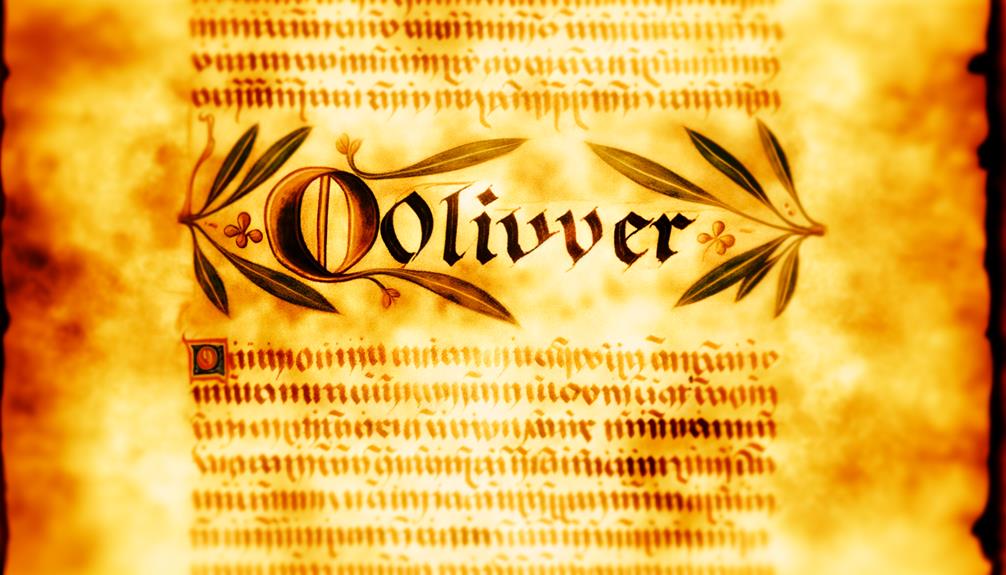
Moving from its theological implications, the name Oliver finds its linguistic origins in the Latin word ‘olivarius,’ which directly translates to ‘olive tree planter.’
This etymology enriches the name with agrarian and pastoral significance, resonating with biblical themes of cultivation and stewardship.
Historically, the olive tree holds profound importance in Judeo-Christian traditions, often symbolizing peace and prosperity.
Scripturally, olives and their oil are referenced numerous times, from the anointing of kings in the Old scripture (1 Samuel 16:13) to Jesus praying at the Mount of Olives in the New scripture (Luke 22:39).
Understanding Oliver’s Latin roots offers a deeper appreciation for its ancient and enduring connections to biblical narratives and the agrarian life central to them.
Olive Tree Symbolism
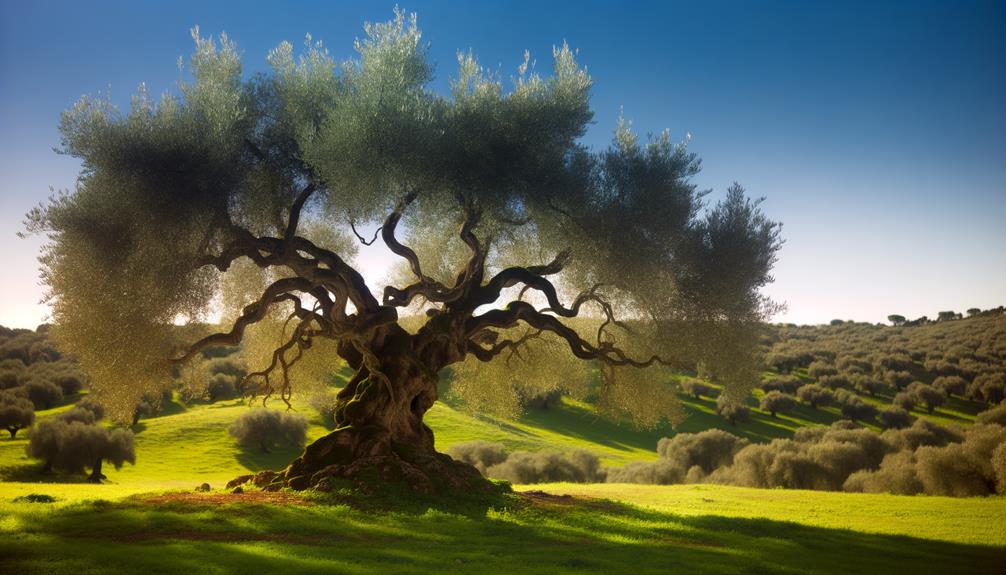
The olive tree holds profound theological significance in the Bible, symbolizing peace, prosperity, and divine blessing.
Historically, it is referenced numerous times, specifically in Genesis 8:11 where a dove brings back an olive leaf to Noah, signaling the end of the flood and God’s forgiveness.
Additionally, Paul employs the olive tree metaphor in Romans 11:17-24 to illustrate the inclusion of Gentiles into the spiritual heritage of Israel.
Olive Tree Significance
In biblical literature, the olive tree is imbued with deep spiritual symbolism, representing peace, prosperity, and divine blessing. This ancient tree holds multifaceted significance throughout scripture:
- Peace: The olive branch is famously associated with peace, as seen in Genesis 8:11, where a dove brings Noah an olive leaf, signaling the end of the flood and God’s reconciliation with humanity.
- Prosperity: Olive oil was a valuable commodity in ancient Israel, signifying economic stability and abundance (Deuteronomy 8:8).
- Divine Blessing: Kings and priests were anointed with olive oil, marking them as chosen by God (1 Samuel 16:13).
- Faithfulness: The longevity and resilience of the olive tree symbolize enduring faith and steadfastness (Psalm 52:8).
These elements underscore the profound emblematic importance of the olive tree in biblical tradition.
Biblical Olive Tree Usage
Building upon the symbolic depth of the olive tree, biblical usage encompasses various contexts that highlight its integral role in religious rituals, societal practices, and prophetic imagery.
In Leviticus 24:2, pure olive oil is mandated for the eternal flame in the Tabernacle, symbolizing God’s perpetual presence.
Historically, olive branches signified peace and prosperity, as seen in Genesis 8:11, when Noah’s dove returns with an olive leaf.
Prophetic texts like Zechariah 4:3-6 use the olive tree to represent God’s provision and the Holy Spirit’s anointing.
The olive tree’s enduring presence in scripture underscores its multifaceted symbolism, linking divine favor, sustenance, and spiritual purity within the biblical narrative.
Olive Tree Metaphors
While the olive tree holds tangible significance in biblical contexts, its metaphorical applications provide profound insights into spiritual truths and divine relationships. The olive tree is rich in symbolism, often illustrating God’s covenant and blessings.
- Peace and Reconciliation: The olive branch, as seen in Genesis 8:11, signifies peace after the flood, symbolizing God’s reconciliation with humanity.
- Divine Anointing: Olive oil was used in anointing kings and priests (1 Samuel 16:13), representing the Holy Spirit’s empowerment and sanctification.
- Israel and Believers: In Romans 11:17-24, Paul uses the olive tree to symbolize Israel and Gentile believers, emphasizing unity and divine inclusion.
- Endurance and Prosperity: Psalm 52:8 likens the righteous to a flourishing olive tree, denoting spiritual significance and steadfastness in God’s house.
These metaphors enrich theological understanding, bridging historical context with scriptural teachings.
Biblical Significance of Olives

The olive tree and its fruit hold profound theological significance in the Bible, symbolizing peace and divine blessing.
In Genesis 8:11, the olive leaf brought back by the dove to Noah’s ark signifies the end of God’s judgment and the restoration of peace.
Additionally, olive oil was used for anointing kings and priests, as seen in 1 Samuel 16:13, marking it as a sacred substance imbued with divine approval and consecration.
Symbol of Peace
In biblical narratives, the olive tree frequently emerges as a profound symbol of peace, reflecting both divine promise and reconciliation. This symbolism is deeply rooted in historical and scriptural contexts:
- Genesis 8:11: After the flood, a dove returns to Noah with an olive leaf, signifying God’s covenant of peace with humanity.
- Psalm 52:8: The psalmist likens himself to a green olive tree in God’s house, symbolizing steadfast faith and peace.
- Zechariah 4:3: Two olive trees flanking the golden lampstand represent harmony and divine provision.
- Romans 11:17-24: Paul uses the olive tree to illustrate the unification of Jews and Gentiles, embodying peace and inclusion in God’s salvation plan.
These references underscore the olive’s enduring significance as a biblical emblem of peace.
Source of Anointment
Throughout the Bible, olives and their oil are frequently associated with anointing rituals, signifying divine favor, sanctification, and consecration.
In Exodus 30:22-33, the Lord instructs Moses to create a sacred anointing oil from olive oil and other spices, used to consecrate the Tabernacle and its priests. This act symbolized the Holy Spirit’s presence and empowerment.
Furthermore, in 1 Samuel 16:13, Samuel anoints David with olive oil, marking his selection as Israel’s future king.
The olive tree itself, mentioned in Zechariah 4:3, represents the continual provision of God’s Spirit.
Hence, olives and their oil are not merely agricultural products but are deeply embedded in the theological tapestry of divine calling and sanctity.
Peace and the Olive Branch
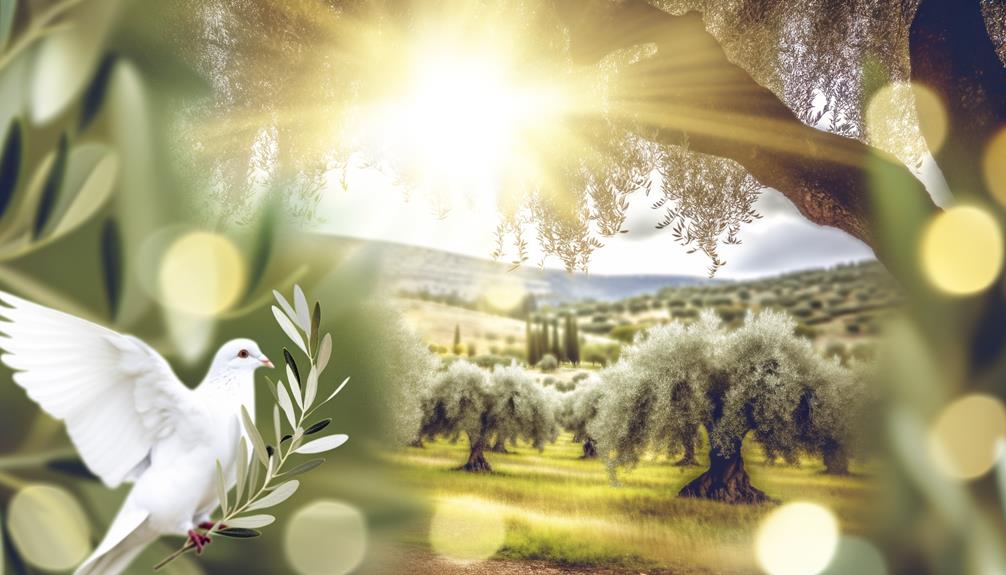
Symbolizing peace and reconciliation, the olive branch has deep roots in biblical narratives, most importantly in the story of Noah’s Ark found in Genesis 8:11. The dove’s return with an olive leaf signified the end of God’s judgment and the restoration of harmony between God and humanity.
To further understand this symbol:
- Renewal of Creation: The olive branch indicated the receding of the floodwaters, symbolizing a new beginning.
- Divine Forgiveness: It represented God’s mercy and a new covenant with mankind.
- Cultural Significance: In ancient Near Eastern cultures, the olive tree symbolized peace and prosperity.
- Prophetic Fulfillment: In Zechariah 4:3, olive trees are seen as symbols of peace and divine blessing.
These elements reveal the profound theological and historical significance of the olive branch in biblical tradition.
Holy Spirit and Olives

The intertwining of the Holy Spirit and olives in biblical texts illuminates the profound connection between divine anointing and spiritual empowerment.
Historically, olive oil was used in anointing rituals, signifying the presence and blessing of the Holy Spirit. For instance, in 1 Samuel 16:13, Samuel anoints David with olive oil, and the Spirit of the Lord comes powerfully upon him. This ritual emphasizes the olive as a symbol of sanctification and divine favor.
Additionally, Zechariah 4:2-6 presents a vision of two olive trees supplying oil to a golden lampstand, symbolizing God’s Spirit empowering His people.
Consequently, olives in biblical contexts underscore a rich tapestry of spiritual significance, linking the material to the divine.
Prosperity and the Olive Tree
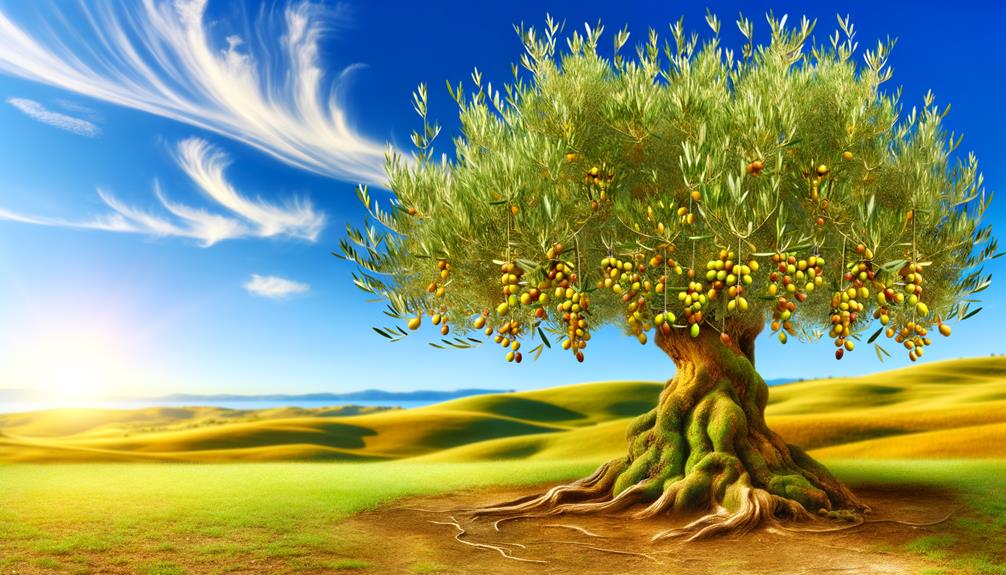
Building upon the spiritual symbolism of the olive, the Bible also portrays the olive tree as a powerful emblem of prosperity and divine blessing.
The ancient Israelites valued olives for their essential roles in daily life and religious rituals. Scripturally, the olive tree is a sign of God’s favor and abundance.
- Psalm 52:8 – ‘But I am like a green olive tree in the house of God: I trust in the mercy of God for ever and ever.’
- Jeremiah 11:16 – The Lord called Israel a ‘green olive tree, fair, and of goodly fruit.’
- Deuteronomy 8:8 – The Promised Land is described as a land of olive oil.
- Zechariah 4:3 – Olive trees provide a continuous supply of oil, symbolizing ongoing divine provision.
Enduring Faith Symbolized

Drawing from its deep roots in biblical history, the olive tree embodies enduring faith, representing resilience and steadfast trust in God’s promises. The olive tree’s capacity to thrive in harsh conditions symbolizes the unwavering faith believers must hold.
In Romans 11:17-24, Paul uses the olive tree to illustrate the inclusion of Gentiles into God’s covenant, signifying a resilient and inclusive faith community. The tree’s ability to regenerate even after being cut down reflects the hope and renewal inherent in divine faith.
| Biblical Symbol | Scriptural Reference | Significance |
|---|---|---|
| Olive Tree | Romans 11:17-24 | Inclusion & Resilience |
| Olive Oil | Psalm 52:8 | God’s Faithfulness |
| Olive Branch | Genesis 8:11 | Peace & Renewal |
| Olive Fruit | Deuteronomy 8:8 | Abundance & Provision |
| Olive Wood | 1 Kings 6:23-31 | Sacredness & Glory |
Olive Trees in Scripture
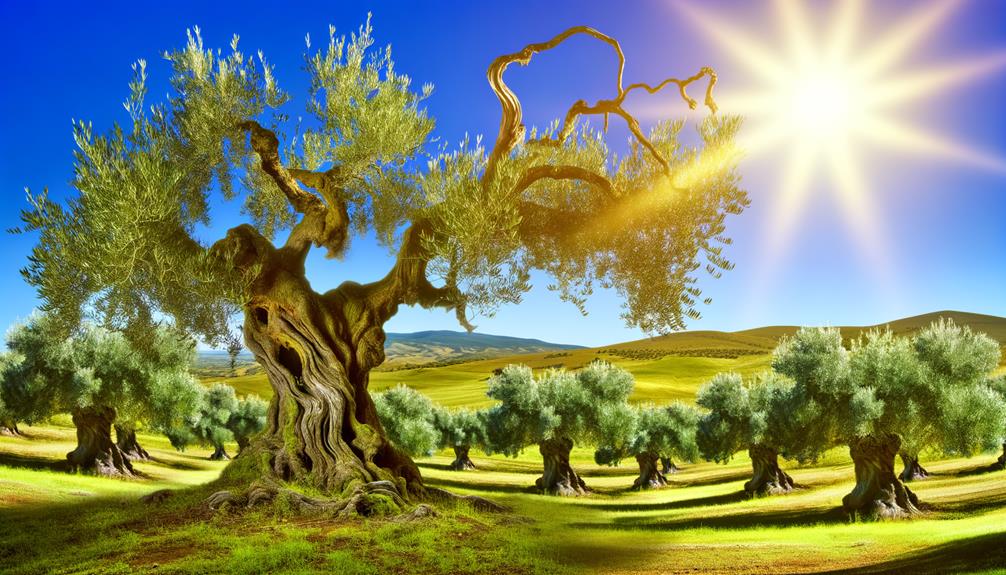
Throughout the Bible, numerous passages highlight the significance of olive trees, underscoring their symbolic and practical importance in the lives of the ancient Israelites. Olive trees are deeply embedded in biblical narratives, serving as symbols of peace, prosperity, and divine blessing. Theologically and historically, their relevance can be seen in several key aspects:
- Covenant with Noah: The dove returned with an olive leaf (Genesis 8:11), symbolizing peace and the end of God’s judgment.
- Anointing Oil: Olive oil was used to anoint kings and priests (1 Samuel 16:13), signifying consecration and the Holy Spirit.
- Provision and Prosperity: Olive trees represented abundance (Deuteronomy 8:8).
- Metaphorical Uses: Israel is likened to an olive tree (Jeremiah 11:16), indicating a chosen and flourishing nation.
Modern Interpretations of Oliver

While olive trees hold profound biblical significance, the name Oliver today carries various modern interpretations that reflect cultural and linguistic evolution. Rooted in the Latin “Olivarius,” which means olive tree planter, Oliver’s contemporary usage often symbolizes peace and fruitfulness, akin to its biblical counterpart. Additionally, in different cultures, the name has acquired unique connotations and associations.
| Culture | Meaning | Scriptural Parallel |
|---|---|---|
| Western | Peace and tranquility | Olive branch symbolizing peace (Genesis 8:11) |
| Eastern Europe | Strength and endurance | Endurance of olive trees (Psalm 52:8) |
| Scandinavian | Heritage and nobility | Olive tree as a symbol of heritage (Romans 11:17) |
This intricate evolution showcases the enduring legacy and adaptability of the name Oliver through the ages.
Inspiring Generations With Oliver
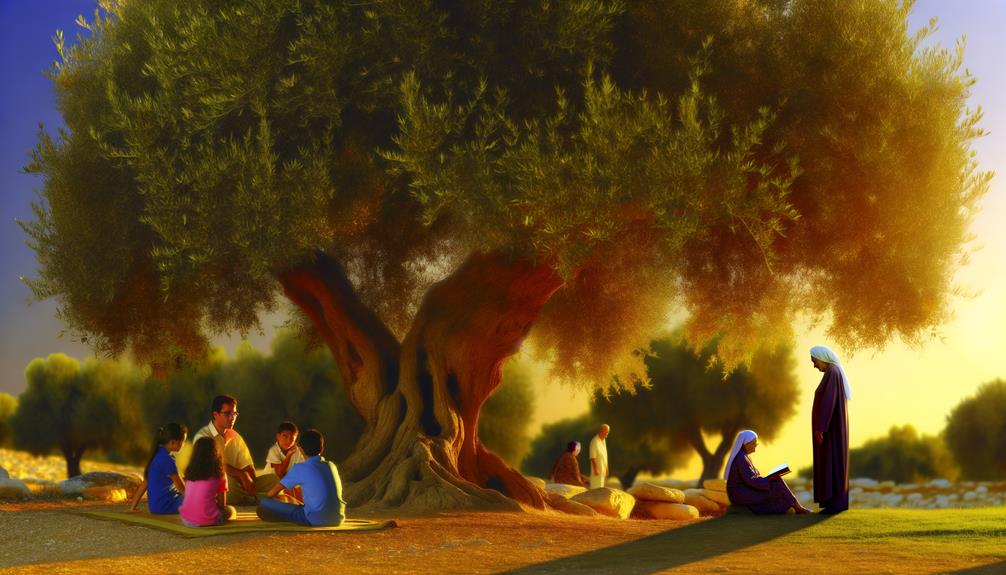
Inspiring countless individuals across generations, the name Oliver has consistently been imbued with profound biblical and historical significance, reflecting its deep roots and enduring legacy. This venerable name has been a beacon of inspiration through various epochs, with its associations extending from scriptural to cultural domains.
- Symbol of Peace: Oliver, derived from the olive tree, symbolizes peace and reconciliation, as seen in Genesis 8:11 when the dove returns with an olive leaf.
- Strength and Endurance: The olive tree’s resilience echoes in Psalm 52:8, where a righteous man is likened to a green olive tree.
- Divine Favor: The olive tree is a symbol of God’s blessing and favor, referenced in Jeremiah 11:16.
Historical Figures: Notable historical Olivers, like Oliver Cromwell, have left an indelible mark on history, furthering its legacy.
Conclusion
In the vast tapestry of biblical history, the name Oliver emerges from the Latin roots entwined with the olive tree, a symbol of peace and enduring faith.
Scriptural references, from Noah’s dove bearing an olive branch to the Mount of Olives, depict olives as emblems of divine covenant and hope.
Through centuries, Oliver has inspired generations, rooted in the rich soil of theological significance and historical depth, offering a perennial symbol of spiritual resilience and tranquility.






